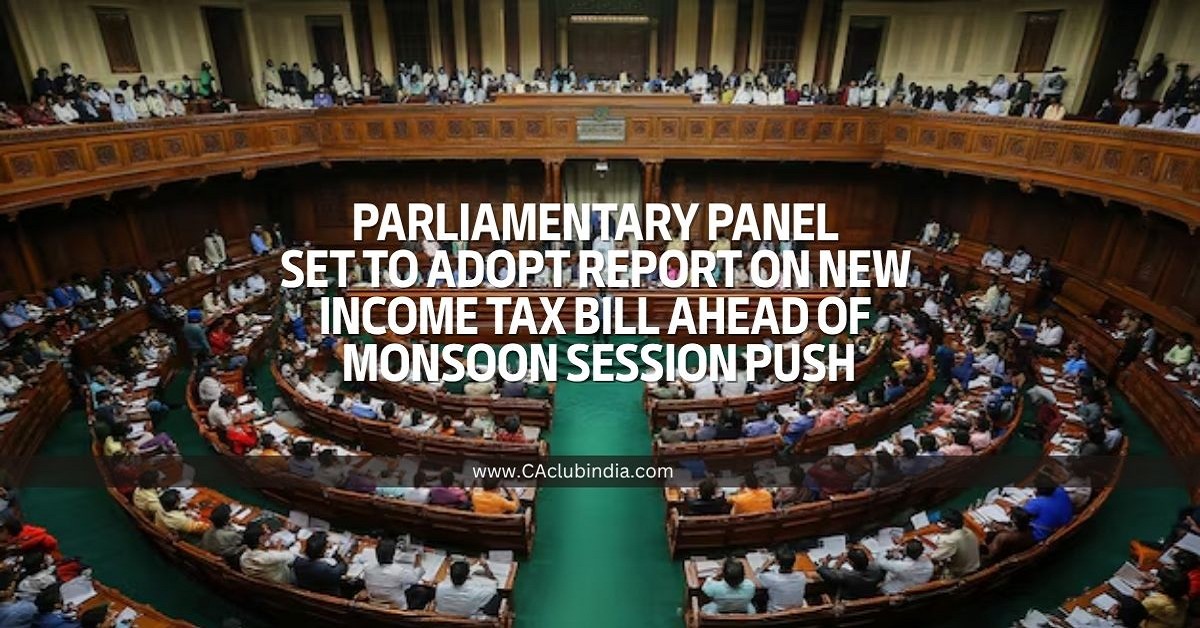A Parliamentary Select Committee chaired by BJP MP Baijayant Panda is scheduled to meet today, i.e. 17th July, Thursday, to adopt its report on the Income Tax Bill, 2025, setting the stage for a potential overhaul of India's income tax legislation.
According to the official notice sent to committee members, the meeting will deliberate on the "consideration and adoption of the Draft Report on the Income Tax Bill, 2025 and the Income Tax Bill, 2025 as amended."

Bill Listed for Consideration and Passage in Lok Sabha
Simultaneously, the Lok Sabha Bulletin has included the bill in the List of Legislative Business for the Monsoon Session, which will run from July 21 to August 21, stating it will be taken up for "Consideration and passing after the Report of the Select Committee is presented to the Lok Sabha."
Following the submission of the report, the government is expected to examine the recommendations and if necessary, seek Cabinet approval before tabling the bill for discussion and passage.
The government aims to implement the new income tax law by April 1, 2026, making this a significant legislative and administrative milestone.
A Modern Overhaul of the 1961 Income Tax Act
The Income Tax Bill, 2025 was originally introduced during the Budget Session in February and is designed to replace the outdated Income Tax Act of 1961, which has undergone more than 4,000 amendments over the decades.
The Finance Ministry has emphasized that the new legislation will:
- Simplify legal language
- Eliminate redundant and repetitive provisions
- Streamline compliance procedures
- Improve taxpayer experience and clarity
The current Act, first enacted in 1961 and operational from April 1, 1962, has become overly complex and difficult to interpret, prompting the need for a completely redrafted law.
Key Features of the New Income Tax Bill
- Reduced Length: The new Bill is almost half the size of the current Act.
- Simplified Drafting: Provisions are grouped logically with minimal cross-referencing, allowing straightforward interpretation.
- Unified Tax Year: The Bill proposes to eliminate the concepts of 'previous year' and 'assessment year', replacing both with a single 'tax year' to streamline filing.
- Improved Reference System: Simplifies citation by removing complex sub-section layering.
The Finance Ministry noted in a detailed FAQ that these measures aim to reduce litigation, clarify obligations and make the law more accessible to ordinary taxpayers.
CBDT Begins Preparation for Implementation
In anticipation of the Bill's enactment, the Central Board of Direct Taxes (CBDT) has initiated a comprehensive implementation roadmap. As per its FY 2025-26 action plan, the department is set to train at least 50% of its workforce on the provisions of the new law by March 2026.
This move signals the government's intent to ensure a smooth and timely transition to the reformed tax regime.
Conclusion
With the Parliamentary Committee's report expected soon and legislative consideration scheduled during the Monsoon Session, India is on the cusp of witnessing its most significant income tax reform in over six decades. The streamlined framework of the Income Tax Bill, 2025, if enacted, promises to simplify tax administration and promote ease of compliance for individuals and businesses alike.









 CAclubindia
CAclubindia

